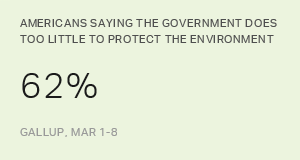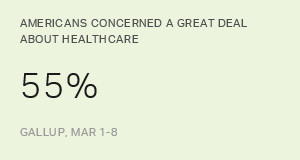Story Highlights
- 47% of Americans favor having the government limit executive pay
- In the aftermath of the Great Recession, 59% supported the idea
- A majority of Democrats continue to show support
WASHINGTON, D.C. -- Americans are evenly divided in their reaction to a proposal for the federal government to take steps to limit the pay of executives at major companies. This contrasts with 2009, when almost six in 10 favored the idea.
| Favor | Oppose | No opinion | |||||||||||||||||||||||||||||||||||||||||||||||||||||||||||||||||||||||||||||||||||||||||||||||||
|---|---|---|---|---|---|---|---|---|---|---|---|---|---|---|---|---|---|---|---|---|---|---|---|---|---|---|---|---|---|---|---|---|---|---|---|---|---|---|---|---|---|---|---|---|---|---|---|---|---|---|---|---|---|---|---|---|---|---|---|---|---|---|---|---|---|---|---|---|---|---|---|---|---|---|---|---|---|---|---|---|---|---|---|---|---|---|---|---|---|---|---|---|---|---|---|---|---|---|---|
| % | % | % | |||||||||||||||||||||||||||||||||||||||||||||||||||||||||||||||||||||||||||||||||||||||||||||||||
| 2018 Mar 26-31 | 47 | 48 | 6 | ||||||||||||||||||||||||||||||||||||||||||||||||||||||||||||||||||||||||||||||||||||||||||||||||
| 2009 June 13-14 | 59 | 35 | 5 | ||||||||||||||||||||||||||||||||||||||||||||||||||||||||||||||||||||||||||||||||||||||||||||||||
| Gallup | |||||||||||||||||||||||||||||||||||||||||||||||||||||||||||||||||||||||||||||||||||||||||||||||||||
Gallup first asked this question in June 2009, just as the U.S. was coming out of the Great Recession and still dealing with the fallout from the 2008 financial crisis and auto company bailouts. As part of the government's efforts to fix the economy, the Department of the Treasury limited executive pay at companies that were receiving federal stimulus money. The Obama administration also sought more oversight of pay for top executives at publicly traded companies.
More generally, Americans' confidence in the economy was well into negative territory in 2009, and the public continued to name the economy as the most important problem facing the nation.
Given all of these circumstances, the majority of Americans were willing to agree with the premise that that government should take steps to limit the pay of executives at major companies.
Today, the economic environment in the U.S. is different, with record-low numbers of Americans worrying about the economy, low numbers naming the economy as the nation's most important problem, and a clear majority saying now is a good time to find a quality job. Reflecting these trends, the percentage of Americans favoring the idea of government control of executive pay has dropped significantly.
The focus on high levels of executive pay, however, is still part of the economic discussion -- both in the U.S. and abroad. The 2010 Dodd-Frank bill, passed in the wake of the recession, mandated that companies publish the ratio between the pay of their CEO and the median pay of their workers. There have been numerous efforts to derail that provision of the law since 2010, but it remains in force, and in 2018, U.S. companies have begun reporting these ratios.
Some of the reported ratios of CEO-to-median worker pay are extremely large, including reports of a CEO's pay being more than 300 times as high as the pay of the average worker -- helping highlight the high executive compensation that is increasingly the norm in large U.S. companies today.
In 2016, the Portland City Council voted to tax a company if the CEO's pay was more than 100 times the median pay of that company's workers. Switzerland in 2013 held an ultimately unsuccessful nationwide referendum that mandated that CEO pay not exceed 12 times the pay of their lowest-paid workers. And the United Kingdom, in measures mirroring the ideas behind the U.S. Dodd-Frank bill, has announced a series of policies attempting to address what is perceived as excessive CEO pay.
Democrats' Support for Curtailing CEO Pay Dips, Though Still High
As would be expected, there are significant differences in partisan reactions to the proposition. The majority of Democrats favor the idea, while the majority of Republicans oppose it. Independents, mirroring the national average, are basically split.
The main reason for the loss in overall support for the measure since 2009 is a drop in support among Democrats and independents. Whereas 77% of Democrats favored limiting executive pay nine years ago, 58% are in favor today. Independents' support has fallen a bit less sharply, from 56% to 45%. At the same time, Republicans' views are essentially unchanged, with roughly four in 10 supporting limits on executive pay then and now.
| Favor | Oppose | |||||||||||||||||||||||||||||||||||||||||||||||||||||||||||||||||||||||||||||||||||||||||||||||||||
|---|---|---|---|---|---|---|---|---|---|---|---|---|---|---|---|---|---|---|---|---|---|---|---|---|---|---|---|---|---|---|---|---|---|---|---|---|---|---|---|---|---|---|---|---|---|---|---|---|---|---|---|---|---|---|---|---|---|---|---|---|---|---|---|---|---|---|---|---|---|---|---|---|---|---|---|---|---|---|---|---|---|---|---|---|---|---|---|---|---|---|---|---|---|---|---|---|---|---|---|---|
| % | % | |||||||||||||||||||||||||||||||||||||||||||||||||||||||||||||||||||||||||||||||||||||||||||||||||||
| Republicans | ||||||||||||||||||||||||||||||||||||||||||||||||||||||||||||||||||||||||||||||||||||||||||||||||||||
| March 2018 | 40 | 56 | ||||||||||||||||||||||||||||||||||||||||||||||||||||||||||||||||||||||||||||||||||||||||||||||||||
| June 2009 | 42 | 56 | ||||||||||||||||||||||||||||||||||||||||||||||||||||||||||||||||||||||||||||||||||||||||||||||||||
| Independents | ||||||||||||||||||||||||||||||||||||||||||||||||||||||||||||||||||||||||||||||||||||||||||||||||||||
| March 2018 | 45 | 48 | ||||||||||||||||||||||||||||||||||||||||||||||||||||||||||||||||||||||||||||||||||||||||||||||||||
| June 2009 | 56 | 39 | ||||||||||||||||||||||||||||||||||||||||||||||||||||||||||||||||||||||||||||||||||||||||||||||||||
| Democrats | ||||||||||||||||||||||||||||||||||||||||||||||||||||||||||||||||||||||||||||||||||||||||||||||||||||
| March 2018 | 58 | 38 | ||||||||||||||||||||||||||||||||||||||||||||||||||||||||||||||||||||||||||||||||||||||||||||||||||
| June 2009 | 77 | 17 | ||||||||||||||||||||||||||||||||||||||||||||||||||||||||||||||||||||||||||||||||||||||||||||||||||
| GALLUP | ||||||||||||||||||||||||||||||||||||||||||||||||||||||||||||||||||||||||||||||||||||||||||||||||||||
Bottom Line
The pay of CEOs of major American companies has been increasing, with total compensation packages for some reaching the tens of millions of dollars. The pay ratios that are now being made public as a result of the Dodd-Frank bill may help make the public more aware of the wage gap between CEOs and the average workers at those companies.
Whether that focus will give rise to renewed efforts to mandate limits on that pay remains to be seen. At this point, in an environment of relative economic prosperity, the American public is split on the issue.
But the fact that 47% continue to favor federal government intervention into what companies pay their executives suggests that if the economy were to turn south again, public pressure for addressing inequality by reining in executive compensation might rise above the majority level once again. Public sentiment might also change if Democrats were to take control of one or more houses of Congress or gain control of the White House in 2020 and if Democratic leaders began to push for these types of policies.
Survey Methods
Results for this Gallup poll are based on telephone interviews conducted March 26-31, 2018, on the Gallup U.S. Poll, with a random sample of 1,513 adults, aged 18 and older, living in all 50 U.S. states and the District of Columbia. For results based on the total sample of national adults, the margin of sampling error is ±3 percentage points at the 95% confidence level. All reported margins of sampling error include computed design effects for weighting.
Each sample of national adults includes a minimum quota of 70% cellphone respondents and 30% landline respondents, with additional minimum quotas by time zone within region. Landline and cellular telephone numbers are selected using random-digit-dial methods.
View survey methodology, complete question responses and trends.
Learn more about how the Gallup U.S. Poll works.




